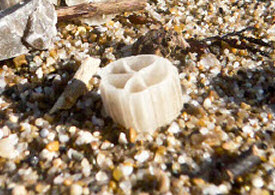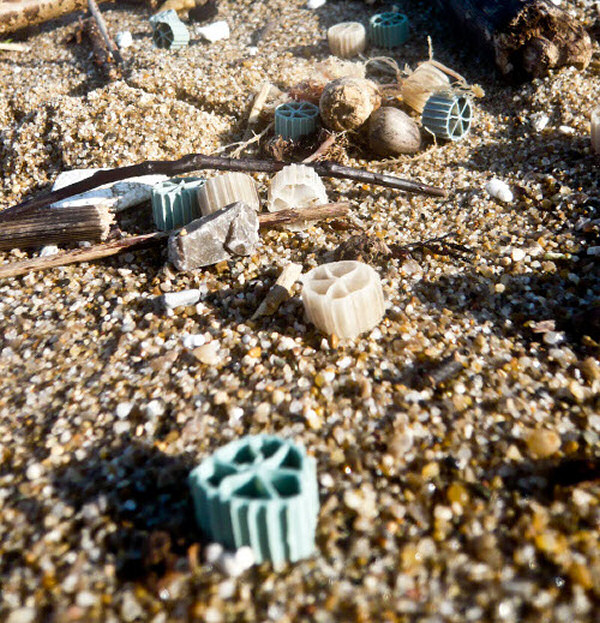SFE: How long has the Surfrider Foundation been aware of this form of pollution? François Verdet: Living on the Basque Coast since July in 2007, I recall seeing these little pieces of plastic on the beaches since my arrival. But in November of 2009, the numbers spiked and the Surfrider Chapter of the Basque Coast took the decision to launch an investigation. Initially, it was challenging because nobody was interested in this type of pollution. We heard rumours that they were packing material for large cargo aboard freighters or even wastes from patrolling submarines! The answer arrived from Corsica. The local Surfrider Chapter, responding to an invitation from the city of Ajaccio for a presentation on a new waste water treatment plant, recognized the little plastic bio-filters on the cover of some printed documents. We could finally put a name and a purpose to the mystery objects that were populating Atlantic beaches in their thousands. SFE: Can you explain what the bio-filters are and how they wound up on the beaches? F.V.: These bio-filters, or bio-carriers (médias filtrants or biomédias in French and biosoportes in Spanish) are actually substrate for micro-organisms used in waste water treatment plants and also in certain industries. It’s very simple: generally speaking, wastes are screened through progressively finer mesh to retain suspended particles. They are then treated chemically or with UV light and the final stage is a biological filtration to eliminate micro-residues. It’s in this final stage that bacteria are at work to break down the wastes. Researchers noticed that this process was more effective if they had some kind of support to attach to. This is why, starting in around 2000, more and more waste water treatment plants as well as industrial plants, were filling their biological ponds with millions the plastic wheels for the bacteria to attach to. Unfortunately, some of the ponds containing the bio-filters overflowed and the filters washed into nearby streams, and then into the ocean. For example, we found instances where this occurred in the Seine in Paris, the Oria River in the Basque Country, and the Minho River in Portugal. In each instance, hundreds of thousands, even millions of the bio-filters, were released into the environment. Credit: Antenne 64 Surfrider SFE: What specific demands and what goals are you targeting with this project? F.V.: Our objective is obviously to get this new form of pollution to stop. It’s so paradoxical to pollute the environment while trying to clean it! Today, a half-dozen people at Surfrider are working on this via several angles: SFE: So how it going today? How is the project going? F.V.: For the media, information and lobbying efforts, we have contacted all the relevant French departments and the elected representatives responsible for coastal management, like the Minister of the Environment, nature-based and aquatic sports organizations. The campaign is part of our Brussels program and we are working on awareness raising in Spain. The 45 Surfrider Chapters in Europe are on alert to react swiftly in case of a new pollution event. Case in point, the Chapter in Picarde has recently encountered this situation. In any case, we are pursuing our investigation into the situation of greatest concern; the coastal Atlantic from Cantabrie (Spain) to the Vendée (France). We have received more than 50 reports on this situation. Unfortunately, several clues lead us to believe that the releases are from one or two entities located on a waterway in northern Spain near the French border. Assuming we’re confident that we’ve identified the responsible parties and the dates of the events, we’re now trying to get information on the quantity of the spill. This could unfortunately reach the tens of millions of individual pieces of plastic! Translation: Dan McDonaldBiofilters wash up on Atlantic beaches
 The beaches of the Atlantic are sprinkled with small plastic wheels: this new phenomenon sparked the suspicions of Surfrider Europe, who launched an investigation that is still underway. A brief interview with François Verdet, manager of Surfrider’s Chapter 64 and lead investigator into the mysterious bio-filters, provides an update on the situation. Elodie Melenec asks the questions.
The beaches of the Atlantic are sprinkled with small plastic wheels: this new phenomenon sparked the suspicions of Surfrider Europe, who launched an investigation that is still underway. A brief interview with François Verdet, manager of Surfrider’s Chapter 64 and lead investigator into the mysterious bio-filters, provides an update on the situation. Elodie Melenec asks the questions.
1. Fieldwork to gather more information and eyewitness accounts for confirmed cases of bio-filter pollution to lodge formal complaints against the emitters.
2. Exposure and media campaigns to raise awareness and improve alert response and also inform responsible authorities and lobby for improved standards for waste water treatment plants. As well, work with the manufacturers and the consultants who recommend the product to clients with the goal to encourage them to improve the process. Overall, we are putting a lot of energy into this bio-filter project because it’s representative of the core principles of Surfrider: the campaign against water pollution. If the concept of providing bacteria with substrate to improve efficiency (we’re talking about a 30% gain in efficiency), the idea isn’t new. For some time now, some wastewater treatment plants have used volcanic rocks as bacterial substrate. It’s of little consequence to see this material escaping into streams and oceans. Unfortunately, for economic and production reasons, plastic has been favoured over natural rock – but the plastic isn’t biodegradable and will incrementally pollute the aquatic environment.
The Rise Above Plastics Blog Has Moved
14 years ago





1 comment:
It’s beautiful place :D
Post a Comment